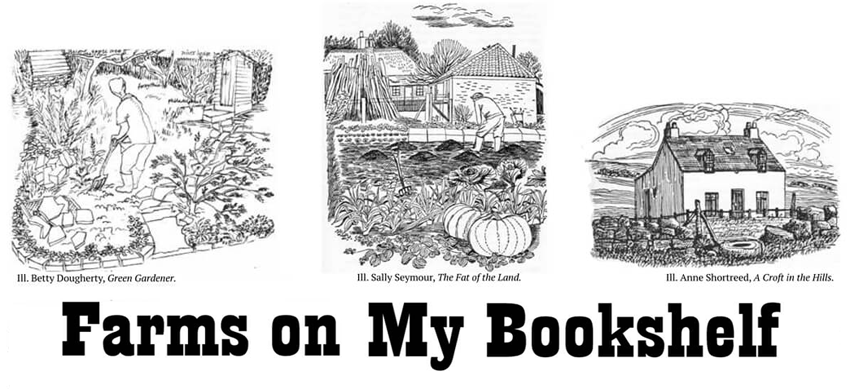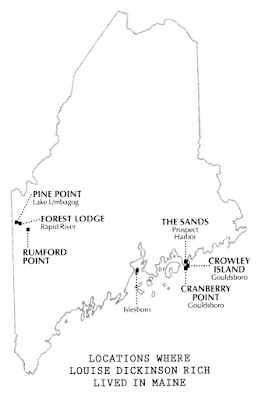My edition is from 1964, with a new foreword and epilogue by the author. Illustrations by Richard Kennedy.
Apple Acre is the story of farming and bringing up young children in the dark days at the beginning of the Second World War. " I had come to this village of Gruncham from West Suffolk just before the Nazi War. I had a few acres there, and later in 1943, I acquired more. Our children were infants when the war started, Anthea was three, the twins (Martin and Sylvia) were only one. We were five miles from the nearest town, and had no car nor petrol to get there. There was a bus twice a week. Otherwise we relied on bicycles or a pony trap for our shoppings. We seldom left the village in those years. There were shortages of the necessities of life - of clothes, food, milk, eggs. We were lucky in having our own pig, our own hens. Our staple food was potatoes and bacon. My wife made all the children's clothes from old garment of hers or a store of material we had laid in in August 1939. We had no piped water. Our well ran dry regularly every summer: unless it rained we could not have baths."
This is the story of Adrian's farm, the landscape, the farmers, craftsmen and other people in the village. Or rather, it is not so much a story as a collection of Adrian's thoughts and observations. After reading the book you don't actually know much about his farm, but you do know what it felt like to live there at the beginning of the war. Adrian needs few words to paint a picture.

One day he and his wife Nora buy six goslings who turn out to be voracious creatures. "We referred to a book and read: "Goslings require very little artificial food, as they consume large quantities of grass." I wished these goslings could read. And then one day towards Michaelmas, they happened to be at the far side of the orchard when I went out with their food. They stretched their necks and came full pelt - full waddle, that is - their wings flapping. Suddenly the leading goose became airborne and then the others. Their feet continued paddling the air. My impression was that they were as surprised as I was to find themselves flying. They gathered momentum, overshot the food, gave one despairing honk at it, and sailed out of sight over the hedge." The geese return to the farmer who sold them to Adrian ...
At first the war hardly seems to intrude and life goes on like it always did. The children seem to take the noises they hear (guns and planes) for granted: "It's only an aeroplane," Anthea says, as we look up and see one of England's battle planes sailing over at two or three hundred miles an hour, and she stoops again to make another sand pie. Aeroplanes are not very interesting birds, Anthea thinks. Not as interesting as the blackbird sitting on five eggs in the hedge." But later the threat of invasion becomes more real and Nora and the children spend a year in northern England.
"The war is more than bombs, it is a state of being. I feel it in the furtive quiet of the town. It is the soul of civilization that has fallen, caved in, long-decayed, hollow: and everybody goes furtively, knowing the end has come."
I especially like this book because of the way Adrian Bell writes about his children. He has an eye for their behaviour, an ear for their talk.
"Martin has seen the big mirror. Nora is left playing nursery rhymes to herself. Mirror superseeds music. Martin is stood up in front of it. He looks first at us in the mirror. They are here, yet they are there: what is the solution? His eyes get wider and blacker. Sylvia is held up to it. She quickly takes it for granted that there should be two of everybody. Anyhow, she is not going to worry about it. Grandma swings her to her reflection: she laughs uproariously. Martin is not amused. To be waved at in the mirror makes it the more puzzling. He struts around the room very worriedlooking."

"Filling being put into a new cake. Anthea has got on to a chair to see. 'I want a piece'. Occasionally she tries something quite obviously unpermissible. 'I want a piece now.' 'Whoever heard of such a thing!' It has worked: she begins to chuckle: 'I want a piece now.' Taking off my boots, feeling warm and cheerful beside the chrysanthemums, I begin, 'Do you know, when Father was a little boy - ' That always makes Anthea look. 'Yes?' 'When Father was a little boy he always had to have two slices of bread and butter before he was allowed to have a piece of cake.' 'Yes. And did your mummy make you a chocolate cake, with fillin' in it?' 'No, it was just a plain sponge cake: (I do remember a lot of plain sponge cake) and no filling in it.' 'Yes." A small voice. I look up sharply. The head is lowered, the face red. The thought of Father getting only plain sponge after the dutiful two slices is almost too much. I hasten to add, 'But if he had been a good boy he used to have a chocolate biscuit sometimes." Yes." A whisper. 'But then', crescendo, 'when it was his birthday he used to have a lovely cake, all sugar icing, and Happy Returns of the Day written in pink, and candles -' 'Yes' The head higher. 'And he used to have lots of little boyes to tea with him, and they played all sorts of games.' A smile. 'Why, look at pussy - she's trying to catch her tail.' She is having a whirling fit on the floor. Relief and joy."

Much has been written about Adrian Bell, there is an Adrian Bell Society , but this book seems to be less well known.
The back flap of my 1964 reprint gives an interesting glimpse into how men and women were thought of at that time: The children of whom he writes in Apple Acre have now grown up. Anthea and Sylvia are married and have young children of their own, while Martin is a journalist. Quite.
Anthea became an eminent translator , perhaps best known for her translations of the Asterix comics.









